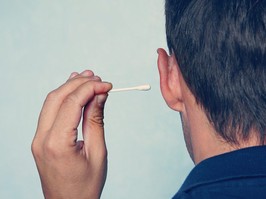can zapping your tongue stop the ringing in your ears?
a new device takes a unique route to treating tinnitus.

young adults, aged 19 to 29 years old, were more likely than older age groups to report an experience with tinnitus.
denis_vermenko
hearing a high-pitched ringing sound might seem like a torture test, but it’s a reality for more than one-third of canadians, according to statistics canada. now, researchers think they might have developed a treatment to temporarily relieve the symptoms of tinnitus. the breakthrough device, called lenire, combines electrical stimulation on the patient’s tongue with a sequence of sounds delivered to a bluetooth headset. published in the journal science, researchers gave the device to 274 adults to wear for a minimum of 36 hours over a 12-week period. of these participants, 74.7 to 88.8 per cent reported a significant improvement in their tinnitus symptoms, with results lasting up to 12 months.
“we know that when you pair two different modalities like sound and somatosensory activation…and you do it in a paired way you can basically drive long-term changes,” said hubert lim, associate professor at the university of minnesota, in a video.
“it was surprising and quite encouraging to see that we could drive significant improvements in tinnitus symptom severity that would then last up to 12 months.”
this device relies on an approach called neuromodulation, in which treatments apply electrical or magnetic stimulation to specific parts of the nervous system in an attempt to moderate or relieve symptoms.
advertisement
a constant ringing in your ears
individuals who suffer from tinnitus experience a constant ringing, hissing, buzzing or roaring in one or both ears, according to the u.s. national institute on deafness. typically, the hallmark characteristic of tinnitus is that this buzzing or ringing occurs without any external source of the sound. you could be in a completely silent room and yet still hear this constant sound.
typically, tinnitus is caused by damage to a part of the patient’s auditory system, such as the sensory hair cells inside the ear, the ear itself, the auditory nerve, or parts of the brain that process sound. tinnitus can also be caused by certain medications, including medication for high blood pressure.
statistics canada estimates that approximately 37 per cent of the canadian population has experienced symptoms of tinnitus. seven per cent reported that they found this condition to be particularly bothersome, affecting their quality of sleep, mood, and ability to concentrate.
young adults, aged 19 to 29 years old, were more likely than older age groups to report tinnitus, which may be due to this age group’s higher exposure to loud music through headphones, clubs, and music venues, as well as exposure to loud environments such as sports games. many, although not all, cases of tinnitus will dissipate over time, according to harvard health. the length of these episodes, any associated hearing loss, or if the condition will become chronic depends on the damage done to the auditory system.
advertisement
turn down the volume
the device may seem promising, but it does not come cheap. a price list from 2019 lists the cost range as $3,336 to $4,578. currently, the device is available at specific clinics in ireland, germany and belgium, although a note on neuromod’s website says it’s working to get fda approval.
some causes of tinnitus are treatable, such as earwax buildup. but if it’s not treatable, doctors can refer patients for other treatments like counselling to cope with the constant ringing, wearing wearable sound generators or hearing aids, as well as anti-depressants and anti-anxiety medication.
acoustic neural stimulation is also a new treatment method for tinnitus that has shown promise in recent years. this method uses specific tones played for the patient through a pair of headphones, which is believed to desensitize the brain to the ringing sounds.
as always, prevention is the best route when it comes to ringing in your ears. earplugs are especially crucial in workplace environments where loud sounds happen frequently. talk to a supervisor about the proper hearing protection for your line of work. consider wearing earplugs to concerts and sporting events and try to keep your headphone volume to a minimum. many phones and music players now come with an ability to set a volume limit so you aren’t tempted to blast your favourite song.
advertisement
don’t miss the latest on covid-19, reopening and life. subscribe to healthing’s daily newsletter covid life.
 3 minute read
3 minute read





